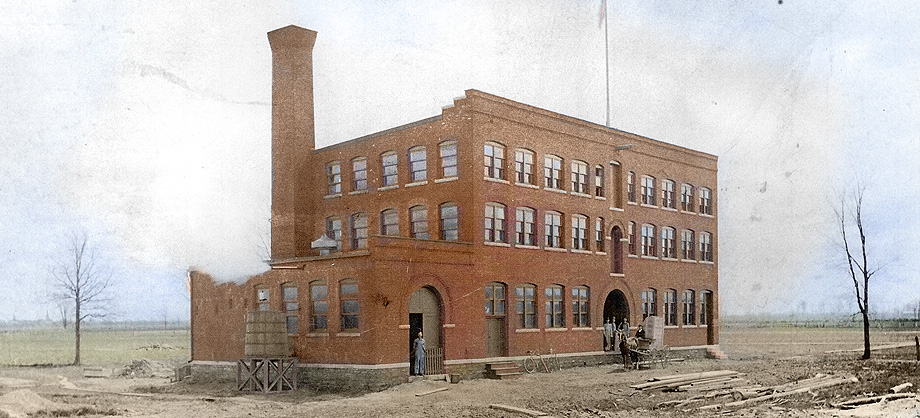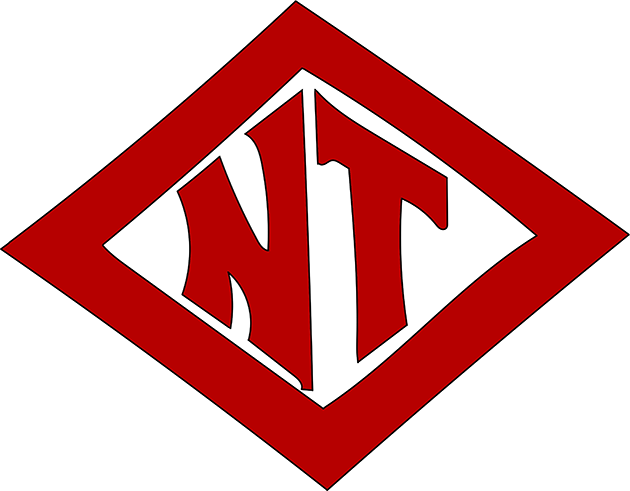North Tonawanda Barrel Organ Factory (1893-1903)
Dublin Core
Title
Description
 Nucleus of Wurlitzer: The North Tonawanda Barrel Organ Factory in 1893. It still stands in 2023.
Nucleus of Wurlitzer: The North Tonawanda Barrel Organ Factory in 1893. It still stands in 2023.
The first of its kind in America, the North Tonawanda Barrel Organ Factory makes automatic musical instruments to provide music for Allan Herschell's world-famous carousels. Led by the fiery Prussian gentleman-genius Eugene de Kleist, the firm survives an early national Depression to succeed beyond its wildest expectations with the help of a musical family from Ohio named the "Wurlitzers."

Before the phonograph and radio, the next best thing to a live orchestra or marching band is a "band organ" or "orchestrion." Essentially giant music boxes with drums, pipe organs, brass horns and more, these devices are popular in Europe for centuries before being produced in the New World in 1893 with the North Tonawanda Barrel Organ Factory.
The factory is built in the spring of 1893 by local merry-go-round makers the Armitage-Herschell Company in the Sawyer's Creek / Martinsville area in the northeast of the recently incorporated City of North Tonawanda. To oversee operations, Armitage-Herschell recruits a German organ maker from London with whom they have been acquainted: the talented Eugene de Kleist. With a small crew of workers culled from England and the surrounding Martinsville farms, the North Tonawanda Barrel Organ Factory also makes organs for churches, offers repairs on existing organs, and makes the pinned barrels that contain the music the organs play. After about a year, Armitage-Herschell sign ownership of the enterprise over to their capable superintendent.
Meet the Wurlitzers
Business is middling until 1897, when de Kleist meets a decades-old musical retail concern from Cincinnati that will prove a valuable partner: the Rudolph Wurlitzer Company. The story goes that de Kleist was looking to interest the U. S. Army in buying his bugles, which were made as part of many of his band organs. de Kleist is told that the Wurlitzer company already has that business, so he approaches Wurlitzer, and is able to sell them some of his bugles. He also tries to interest Wurlitzer in his band organs, but they ask if he coud instead produce a coin-operated piano for use in taverns and restaurants. After over a year in development, the first "Tonophones" are ready in 1898, and are an immediate success. (Hear Farny Wurlitzer tell this story himself in this remarkable speech from 1964).
Similiar instruments, such as the Pianino, follow, and the small factory begins to grow, and over the next few years establishes the northwest corner of the massive Wurlitzer plant still standing in North Tonawanda today.
The de Kleist Musical Instrument Manufacturing Company
In 1903, the Barrel Organ Factory incorporates as the de Kleist Musical Instrument Manufacturing Company, with investment from banker James Thompson and some new top brass. Wurlitzer's interest in the North Tonawanda plant increases as Eugene de Kleist's seems to wane (see de Kleist's bio for more on this). In 1905 a group of workers leaves to form the Niagara Musical Instrument Manufacturing Company; within a year another wave of defectors forms the North Tonawanda Musical Instrument Works.1908 begins auspiciously: in January, de Kleist (now mayor of North Tonawanda) lavishly fetes 700 employees and their families in the new music department building. His superintendent, Paul Von Rohl, delivers a speech in his honor, and they dance and carouse until morning light begins filtering over Sawyer's Creek.
The following months will not be as good. de Kleist files a $50,000 infringement lawsuit against the aforementioned Instrument Works, but loses. In March, he leaves the aforementioned Paul Von Rohl in charge of the factory while he is off racing powerboats in Florida. de Kleist returns to suspect there has been rampant theft in his absence, and brings charges of grand larceny against Von Rohl, which are dropped, replaced by petit larceny charges, and then found unproved by a jury. In April, Mayor de Kleist accuses eight employees of stealing valuable machinery and plans from his factory, and of conspiring to start another rival factory. The summer brings more powerboating and politicking.
Perhaps fearing for the security of their investment, Wurlitzer buys Eugene de Kleist out. The Rudolph Wurlitzer Manufacturing Company is organized in December of 1908 with $1,000,000 capital.
Land deeded to De Kleist on January 1st 1894, foreclosure sale notice (Tonawanda News, 1902-10-18).jpg

The Realm of Music, North Tonawanda Barrel Organ Factory, article and transcriptions (Tonawanda News, 1894-01-04).jpg

Transcription by Dana Johnson: The Realm Of Music Where harmony producing instruments are manufactured Home of the organ…
1896 deK, Annual Report on Factory Inspection, Volume 10 (New York State, Bureau of Factory Inspection).jpg

de Kleist, Eugene Frederick.jpg

(1853–1913) German-born Eugene de Kleist settles at Sawyer's Creek in Martinsville in 1893, having been recruited by the Armitage-Herschell…
1898 deK, Annual Report on Factory Inspection, Volume 12 (New York State, Bureau of Factory Inspection).jpg

1900 deK, Annual Report on Factory Inspection, Volume 14 (New York State, Bureau of Factory Inspection).jpg

Organ patent of Eugene de Kleist (Official Gazette of the United States Patent Office p1330, 1904-12-09).jpg

De Kleist buildings to be painted, new addition almost complete, article (Tonawanda News, 1907-08-09).pdf

Eugene de Kleist's Berlin apartment, Kurfürstendamm street, photo set (c1913).jpg

Contributed by a de Kleist descendant.
Former de Kleist home on Wurlitzer grounds demolished, photo article (Tonawanda News, 1955-07-30).jpg


















































